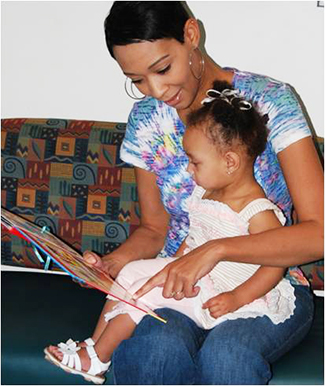Ypsilanti Health Center:
The University of Michigan Ypsilanti Health Center was one of our original Reach Out and Read clinics. The patient population is predominantly low-income and is culturally diverse. For many of these patients, the books they receive from ROR are the only books they own. The Ypsilanti Health Center serves as a model for clinics starting a Reach Out and Read program. YHC has two practices: Ypsilanti Family Medicine and Ypsilanti Pediatrics and ROR serves children in both practices.

East Ann Arbor Health and Geriatrics Center:
The East Ann Arbor Health Center is a large modern clinic affiliated with the University of Michigan; it has two practices that involve ROR, General Pediatrics and Adult Medicine & Pediatrics. The ROR U-M program trains the staff and provides books for both clinics. The pediatric waiting room serves as a model of a child-friendly, literacy rich area for young patients.
“As a doctor, the books are helpful to me during well child exams. It’s a great way to interact with the child from the time I walk in the room. I can observe how the child plays with the book so I can assess their development. I can ask a child to point to certain colors or letters. It’s also a great way to keep the child occupied while I talk to mom or dad. Reading is such an important skill and this program helps us foster a love for reading.”
Heather Burrows, MD, PhD
Pediatrician
Briarwood Center for Women, Children, and Young Adults:
Briarwood (formerly Briarwood Health Associates (BHA)) is a University of Michigan pediatric clinic that has approximately 2,500 well-child visits per year. The patient population is very diverse. The Briarwood center joined ROR U-M in 2005, and staff and pediatricians are exceptionally enthusiastic about the program, becoming a popular site for volunteer ROR waiting-room readers.
Howell Pediatrics:
Howell is a fairly rural area, and the University of Michigan Howell Pediatrics became the sixth ROR U-M clinic in 2009. Many patients’ families have been hit hard by the difficult economic times in Michigan. It is difficult for them to provide the things their children need, such as books. The staff at Howell Pediatrics help support these families by giving them books and advice on the importance of reading to their children, even when times are tough. Howell Pediatrics sees an average of 1080 patients per year (30-35% are Medicaid or Medicare patients).
Canton Health Center:
The University of Michigan Canton Health Center became the Eighth ROR-UM clinic in 2011. Canton provides over 4,250 well-child visits each year, and is therefore similar in size to our other large ROR sites. This center was not previously included as a ROR site because it historically did not have a high proportion of low-income families. The Canton community had been particularly struck by the economic downturn, with the proportion of children seen at CHC receiving Medicaid increasing dramatically over the past 8 years to 34% in 2011. This demographic profile places CHC squarely among our current clinic sites in terms of patient need.
Saline Health Center:
The University of Michigan Saline Health Center Pediatrics joined ROR-UM with three other clinics in late 2016 as part of an effort to expand the benefits of the program across all U-M pediatric clinics in order to reach a larger number of children and families in southeast Michigan as well as promote awareness of the program to more communities. Saline Pediatrics has its share of families who are unemployed, parents who cannot read, and others who do not feel reading is important, and thus the clinic is thrilled to have ROR-UM’s assistance in supporting all of their young patients through literacy promotion.
“Our families have a wide range of incomes and abilities, but all children deserve literacy support. We are excited about the opportunity to offer books to take home to all our patients ages 6 months through 5 years. Our site is also part of the University of Michigan Pediatric Residency training program. Inclusion of Reach Out and Read at our site will also train future pediatricians about the importance of literacy in children.”
Jill Noble, MD
Pediatrician
Northville Health Center:
The University of Michigan Northville Health Center Pediatrics was one of the four U-M clinics joining ROR-UM in late 2016. This clinic serves a significant amount of low income families, as shown by a 30% Medicaid rate. All families served at the clinic greatly benefit from the program and literacy promotion.
Brighton Health Center:
The University of Michigan Brighton Health Center was added to the ROR-UM program in November 2016. This clinic serves a wide variety of patients both from very poverty stricken backgrounds to well-endowed populations. Doctors and clinic staff also feel it is important to expose the residents and medical students that rotate in the clinic to the positive influence such a program can have on a community. Many of these trainees will further their careers in communities that are also in need of such a program.
West Ann Arbor Health Center:
The University of Michigan West Ann Arbor Health Center Pediatrics joined ROR-UM in late 2016 as part of a significant endeavor to expand the university’s effective literacy program. With the addition of this clinic, ROR-UM is now able to serve a total of twelve local pediatric sites. West Ann Arbor Pediatrics is dedicated to maintaining the mental and physical health of patients and ensuring their success, particularly in school. Access to age-appropriate books significantly benefits the 25% of West Ann Arbor Health Center patients who either have Medicaid or no insurance.



